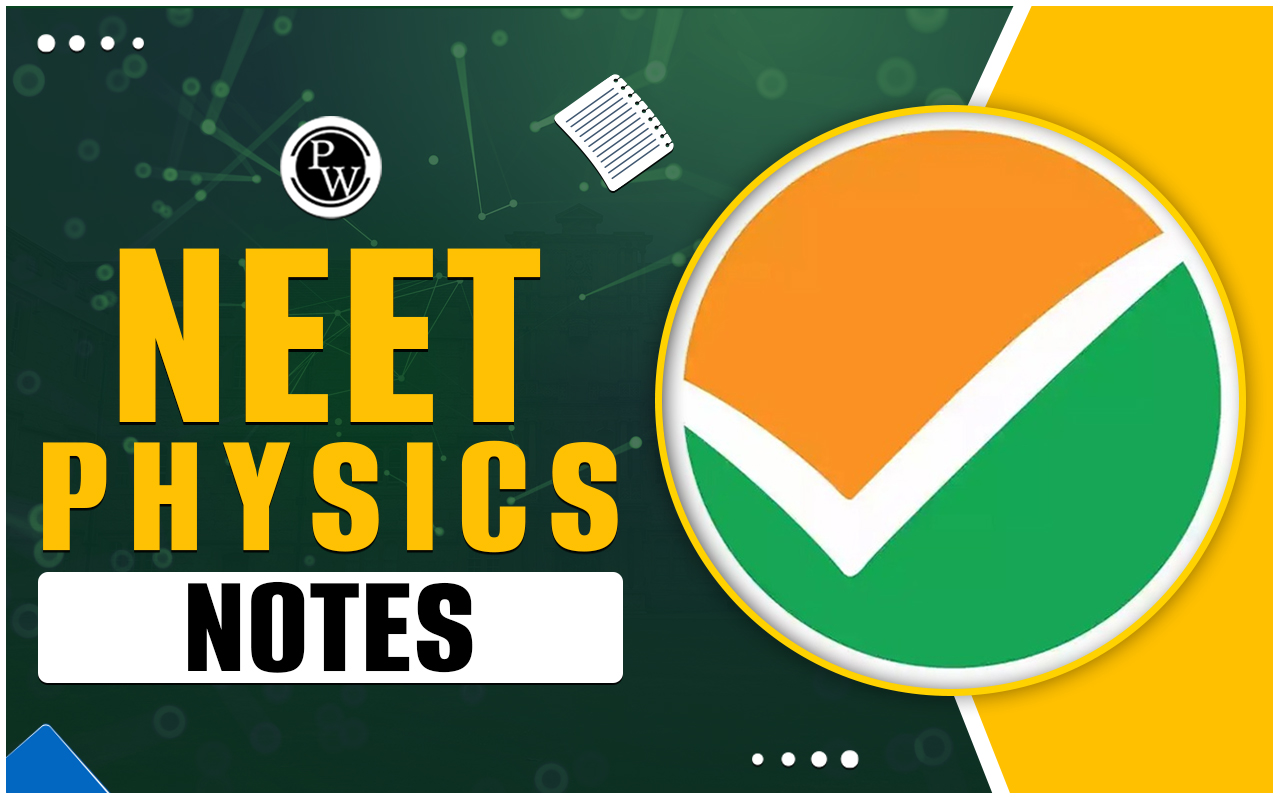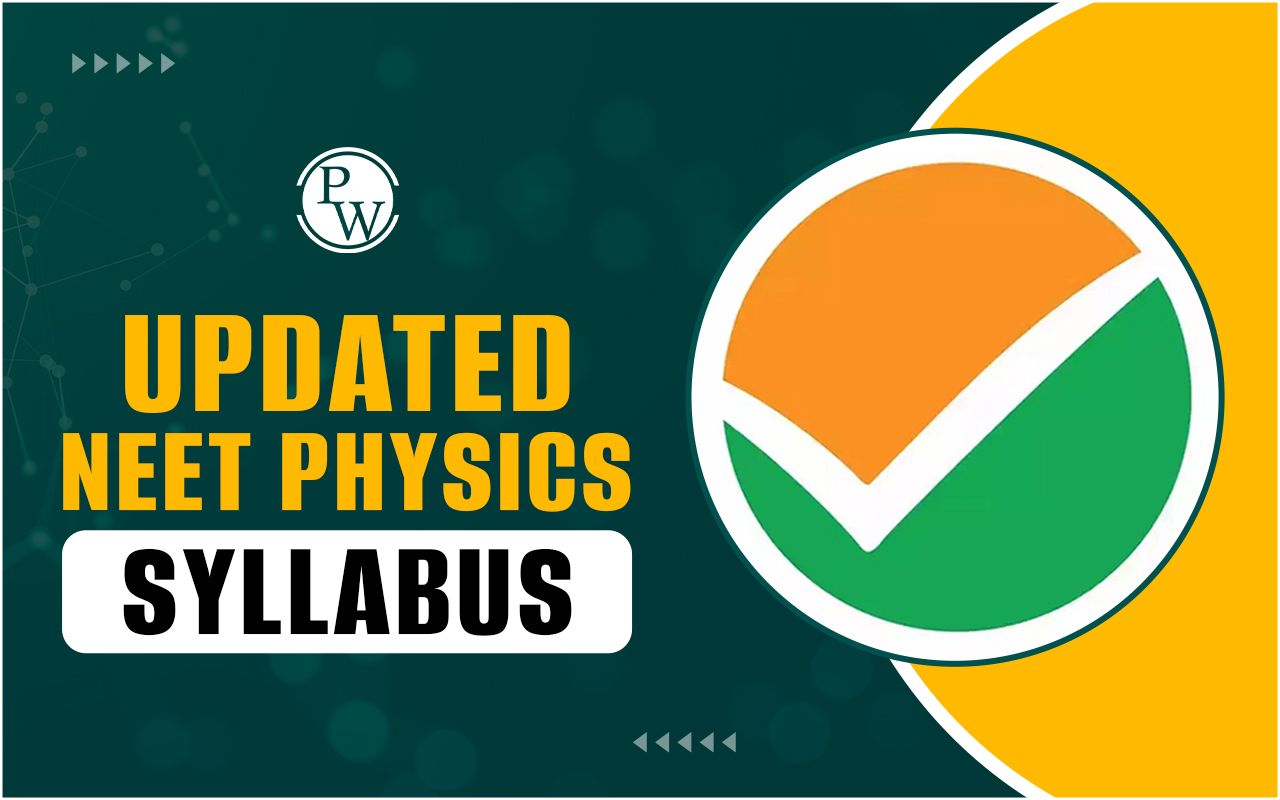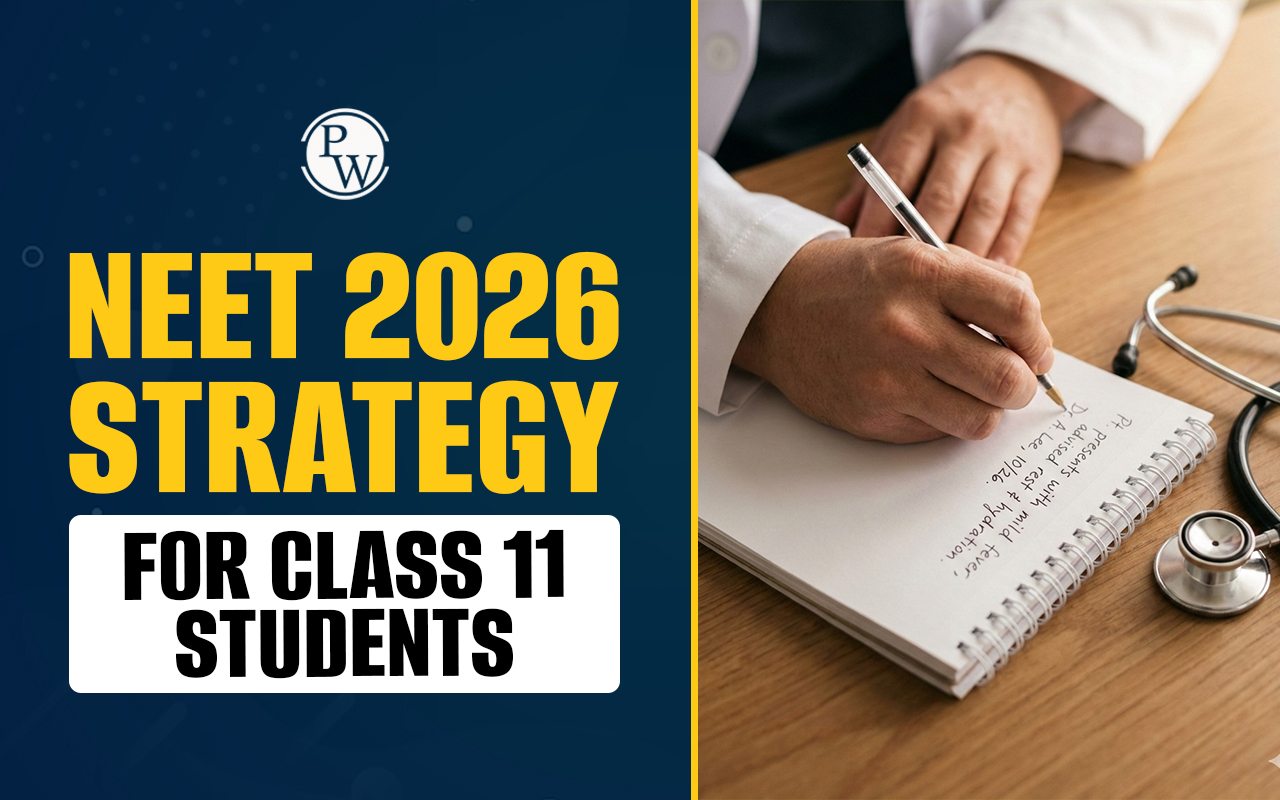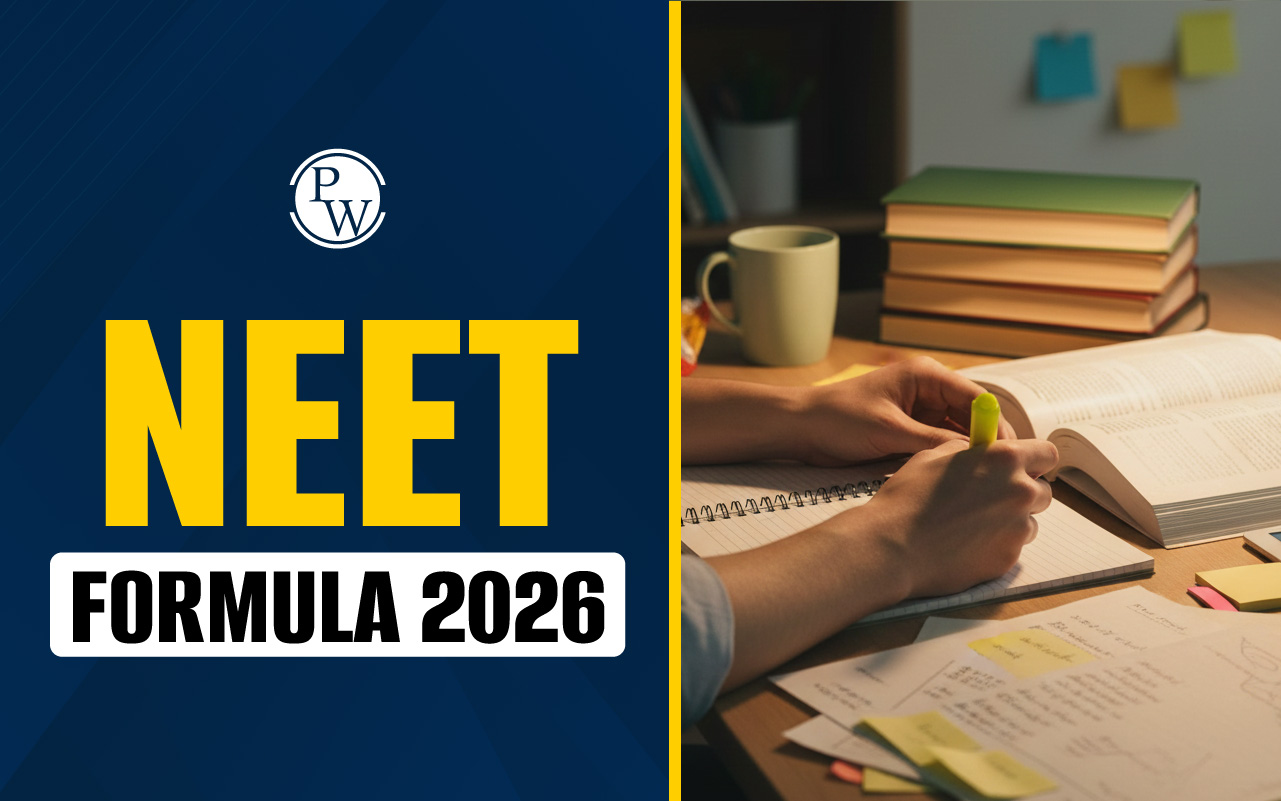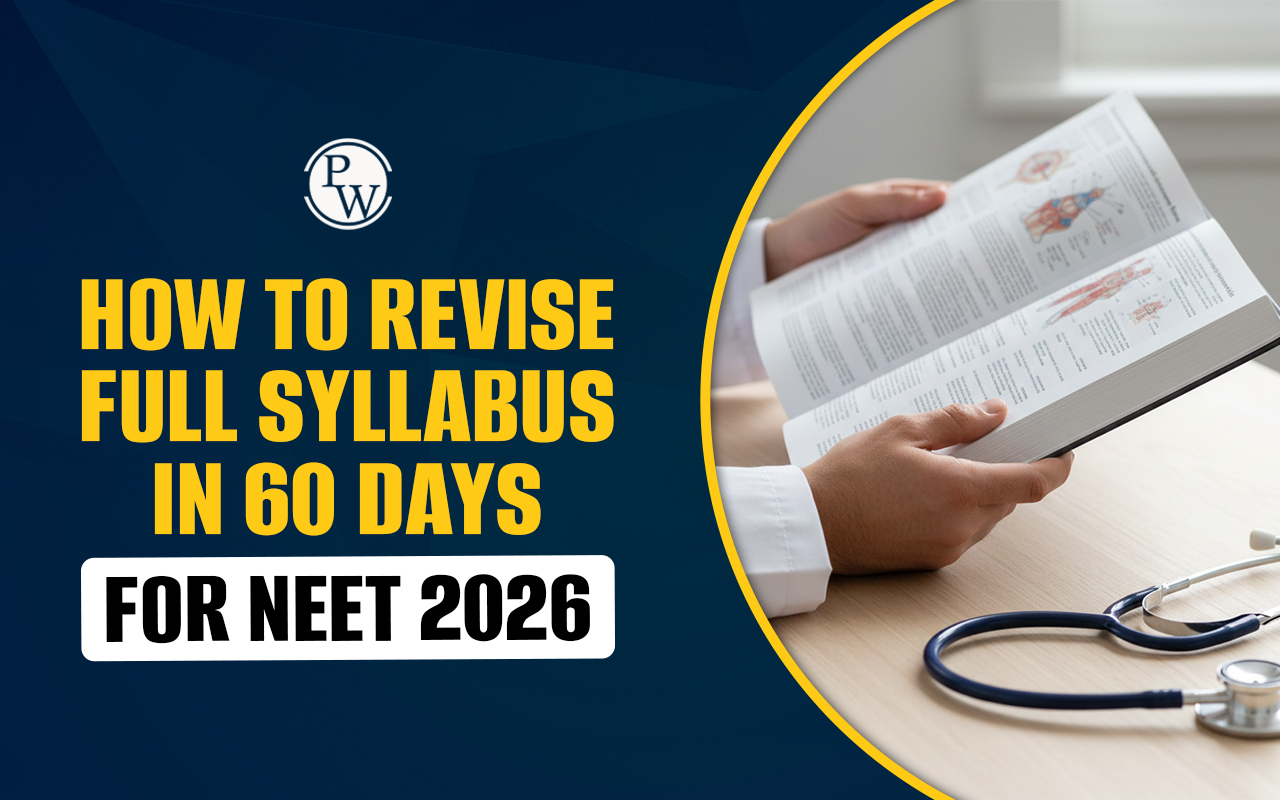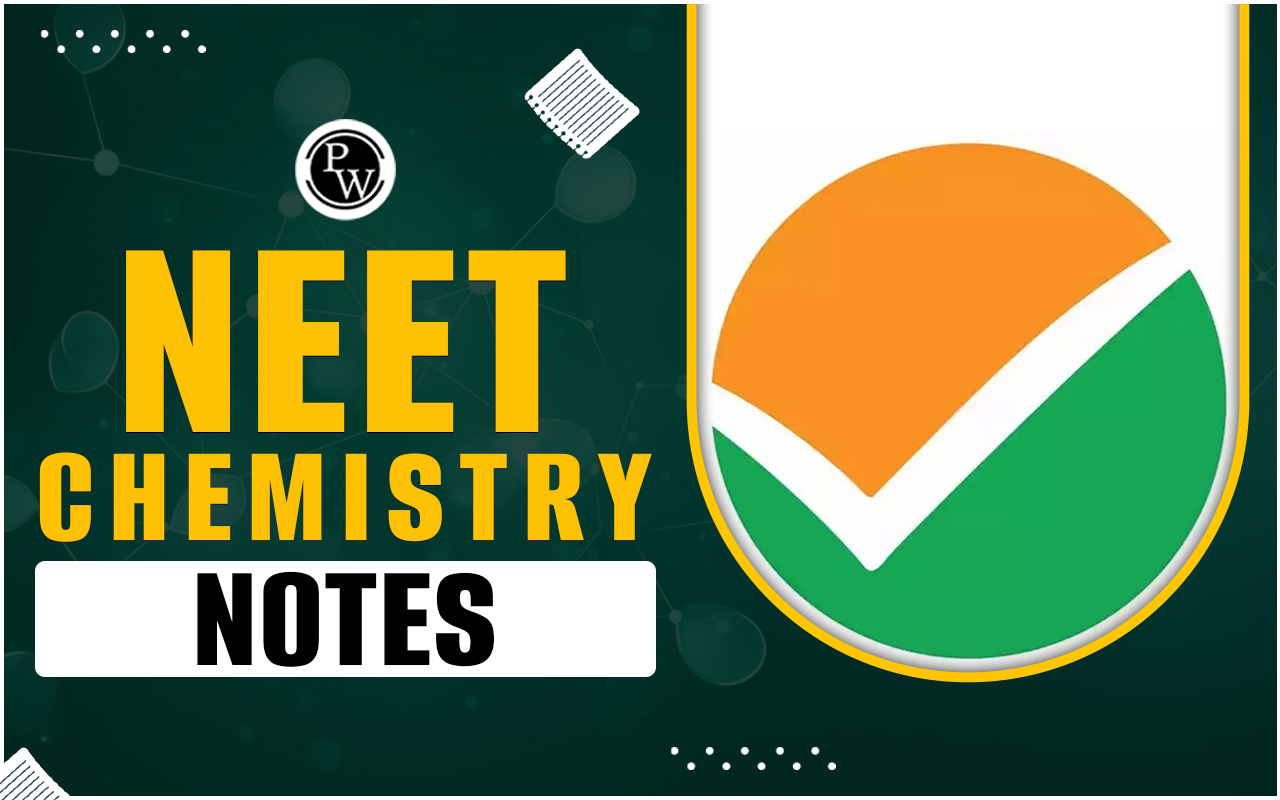
NEET Chemistry Syllabus 2026: National Testing Agency (NTA) has officially released the NEET Chemistry Final Syllabus 2026 on 8th January 2026 on its website. The syllabus covers topics from Class 11 and Class 12, divided into Physical Chemistry, Organic Chemistry, and Inorganic Chemistry.
Candidates preparing for NEET 2026 should follow the officially published syllabus to ensure complete coverage. Understanding key concepts and practicing application-based questions from all three sections is essential for scoring well in the Chemistry section of the exam.
NEET Chemistry Final Syllabus 2026 Out
The National Testing Agency (NTA) officially released the NEET UG 2026 Chemistry final syllabus on January 8, 2026, confirming alignment with the rationalized NCERT Class 11-12 curriculum. Covering Physical, Organic, and Inorganic sections, it retains high-weightage topics like Chemical Bonding, Coordination Compounds, and Biomolecules while excluding States of Matter and certain P-Block subtopics. This 180-mark section features 45 questions emphasizing conceptual clarity and numericals, with no major additions from prior years. Download the detailed chapter-wise PDF for precise preparation strategy.
NEET Chemistry Syllabus 2026 Overview
The NEET Chemistry Syllabus 2026 contains topics from both Class 11 and Class 12 NCERT textbooks, designed to test a student's understanding and application of chemical principles. It includes three main sections: Physical Chemistry, Organic Chemistry, and Inorganic Chemistry. Each section is crucial and carries significant weightage in the exam.The
NEET 2026 Chemistry Syllabus aims to build a strong foundation for a medical professional. By covering a wide range of topics, it ensures that students are well-equipped to tackle the diverse questions posed in the NEET exam.
| NEET Syllabus 2026 for Physics and Biology | |
|---|---|
| NEET Chemistry Notes 2026 | NEET Chemistry Chapter wise weightage |
NEET Chemistry Syllabus 2026 PDF
NEET Chemistry Syllabus 2026 PDF has been officially released by the National Testing Agency (NTA) on its official website. This PDF provides the complete, unit‑wise list of topics that candidates must study for the NEET UG 2026 exam, covering Chemistry from both Class 11 and Class 12 NCERT textbooks. Downloading the official NEET Chemistry Syllabus 2026 PDF helps aspirants plan their preparation effectively, ensure full syllabus coverage, prioritise high‑weightage areas, and avoid missing any important concepts as per the latest NTA guidelines.
NEET Chemistry Syllabus 2026 PDF
NEET Chemistry Syllabus 2026
The NEET 2026 Chemistry syllabus has been officially released by the National Testing Agency (NTA) on its website. It includes chapters from both Class 11 and Class 12 NCERT textbooks and is designed to assess a student’s understanding of Chemistry concepts. The syllabus is divided into Physical Chemistry, Organic Chemistry, and Inorganic Chemistry, with each section carrying significant weight in the exam. Students are advised to prepare all chapters thoroughly to maximize their scores in NEET 2026.
NEET Chemistry Syllabus 2026 For Class 11
The NEET 2026 Chemistry syllabus for Class 11 covers important topics that help build the basics for Class 12 chapters. Some main topics are Some Basic Concepts of Chemistry, Thermodynamics, Organic Chemistry – Basic Principles and Techniques, and Equilibrium. These topics are very important to understand Chemistry clearly. A strong understanding of Class 11 chapters will help students solve difficult questions in the NEET exam.
| NEET Chemistry Syllabus 2026 For Class 11 | |
|---|---|
| Chapter Name | Topics |
| Some Basic Concepts of Chemistry | Mole Concept, Determination of Formula of Compound, Stoichiometric Calculations, Concentration Terms, Relation Between Molarity and Normality |
| Redox Reactions | Oxidation Number, Redox Reactions, Balancing of Redox Reactions, Electrochemical Cell |
| Structure of Atom | Subatomic Particles, Concept of Atomic Number and Mass Number, Bohr's Model of an Atom, Particle Nature of Electromagnetic Radiation, Photoelectric Effect, Quantum Mechanical Model, Quantum Numbers, Electronic Configuration of Atoms |
| Thermodynamics | P-V Work, Heat Capacity, Thermochemistry, Second Law of Thermodynamics |
| Equilibrium | Applications of Equilibrium Constant, Equilibrium Constant, Factors Affecting State of Equilibrium, Expressing Hydrogen Ion Concentration, Buffer Solution, Solubility of Sparingly Soluble Salts |
| Organic Chemistry – Some Basic Principles and Techniques | Naming the Organic Compounds, Isomerism in Organic Compounds, Electronic Displacements in Covalent Compounds, Reaction Intermediates, Hybridisation |
| Hydrocarbons | Conformations of Hydrocarbons, Isomerism in Alkenes, Stability of Alkene, Chemical Reactions of Alkenes, Chemical Reactions of Alkynes, Aromatic Hydrocarbons, Chemical Reactions of Aromatic Hydrocarbons |
| Classification of Elements and Periodicity in Properties | Modern Periodic Table, Periodic Trends in Properties of Elements |
| Chemical Bonding and Molecular Structure | General Introduction, Polarity of Bonds, Covalent Character in Ionic Bonds, Geometry or Shapes of Molecules, Concept of Orbital Overlap in Covalent Bonds, Molecular Orbital Theory (MOT), Hydrogen Bond |
| Principles Related To Practical Organic Chemistry | Analysis of Organic Compounds, Volumetric Analysis, Qualitative Salt Analysis, Enthapy |
| The p-Block Elements Part 1 | Group-13 Elements, Group-14 Elements |
NEET Chemistry Syllabus 2026 For Class 12
The NEET Chemistry syllabus 2026 for Class 12 includes higher-level topics that are very important for the exam. Some key chapters are Aldehydes, Ketones and Carboxylic Acids, The d- and f-Block Elements, Chemical Kinetics, and Coordination Compounds. These topics need clear understanding and good problem-solving skills.
| NEET Chemistry Syllabus 2026 For Class 12 | |
|---|---|
| Chapter Name | Topics |
| Solutions | Solubility of Gases in Liquids, Vapour Pressure of Liquid Solutions, Colligative Properties, Abnormal Molar Masses |
| Chemical Kinetics | Dependence of Reaction Rate on Concentration, Integrated Rate Expressions, Dependence of Reaction Rate on Temperature |
| Electrochemistry | Electrolytic Conduction, Variation of Conductivity and Molar Conductivity with Concentration, Kohlrausch's Law, Electrochemical or Galvanic Cell, Electrochemical Series, Dependence of Cell and Electrode Potentials on Concentration, Electrolytic Cells and Electrolysis, Fuel Cells |
| Haloalkanes and Haloarenes | Chemical Properties of Haloalkanes, Chemical Properties of Haloarenes, Polyhalogen Compounds |
| Alcohols, Phenols and Ethers | Alcohols: Reactions Involving Cleavage of (O-H) Bond, Alcohols: Reactions Involving Cleavage of (C-O) Bond, Alcohols: Reactions Involving Cleavage of Both Alkyl & Hydroxyl Groups, Phenols: Reactions of Phenolic Group, Phenols: Reactions of Benzene Ring, Phenols: Special Reactions, Distinction Between Alcohols and Phenols |
| Aldehydes, Ketones and Carboxylic Acids | Aldehydes & Ketones: Nucleophilic Addition Reactions, Aldehydes & Ketones: Oxidation Reactions, Aldehydes & Ketones: Reduction Reactions, Aldehydes & Ketones: Reaction with Base, Carboxylic Acids |
| Amines | Preparation Methods, Chemical Properties, Ring Substitution in Aromatic Amines, Distinction Between Amines |
| Biomolecules | Glucose and Fructose, Glucose: Reaction Due to Open Chain Structure, Disaccharides, Proteins, Nucleic Acids |
| Coordination Compounds | Ligands, Werner's Theory, Coordination Compounds, Isomerism in Coordination Compounds, Bonding in Coordination Compounds |
| The d- and f- Block Elements | Introduction, General Properties of Transition Elements, Compounds of Transition Metals, Inner Transition Elements (Lanthanoids), Inner Transition Elements (Actinoids) |
| The p-Block Elements Part 2 | Group-15 Elements, Group-16 Elements, Group-17 Elements, Group-18 Elements |
Section wise NEET Chemistry Syllabus 2026
The NEET Chemistry Syllabus 2026 is divided into three main sections: Physical Chemistry, Organic Chemistry, and Inorganic Chemistry. Each section covers specific topics that test different aspects of a student's knowledge and skills. Understanding the weightage and focus of each section helps in allocating study time effectively and ensuring a balanced preparation. Let's explore each section in detail to understand the topics covered and their significance.
NEET Physical Chemistry Syllabus 2026
The NEET Physical Chemistry Syllabus 2026 includes topics such as Thermodynamics, Chemical Kinetics, Equilibrium, and Solutions. These topics focus on the physical principles governing chemical reactions and states of matter.
Students need to understand concepts like energy changes, reaction rates, and the behavior of gases and liquids. Physical Chemistry is heavily calculation-based, so practice and familiarity with numerical problems are crucial for scoring well in this section.
| NEET Physical Chemistry Syllabus | |
|---|---|
| Topic | Sub-Topics |
| Basic Concepts of Chemistry | Atomic structure, Elements, and Classification of Elements |
| States of Matter: Gases and Liquids | Kinetic theory, Real gases, Liquid State |
| Thermodynamics | Thermodynamic system, Work, Heat, First Law of Thermodynamics, Enthalpy, Second Law of Thermodynamics, Gibbs Energy, Entropy, Gibbs-Helmholtz equation, Spontaneity and Equilibrium, Clausius inequality, Thermochemistry |
| Chemical Equilibrium | Law of mass action, Le Chatelier's principle, Ionization of acids and bases, Buffer solutions, Solubility product, Common ion effect, pH scale, Hydrolysis of salts |
| Redox Reactions | Balancing of redox reactions, Electrochemical series, Nernst equation, EMF of a cell, Fuel cells, Corrosion, Electrolysis |
| Chemical Kinetics | Rate of reaction, Factors influencing the rate of a reaction, Arrhenius equation, Collision theory, Catalysis |
| Surface Chemistry | Adsorption, Colloids, Emulsions, Micelles |
| Classification of Elements and Periodicity | Periodic table, Trends in properties of elements, Electronic configuration, Ionization energy, Electronegativity |
| Hydrogen | Position in periodic table, Isotopes, Preparation, Properties, Uses, Hydrides |
| s-Block Elements | Alkali metals, Alkaline earth metals |
| p-Block Elements | Boron family, Carbon family, Nitrogen family, Oxygen family, Halogens, Noble gases |
| d- and f- Block Elements | Transition metals, Inner transition metals |
| Coordination Compounds | Nomenclature, Isomerism, Bonding in coordination compounds, Werner's theory, Valence bond theory, Crystal field theory |
| Purification and Characterization of Organic Compounds | Purification methods, Qualitative analysis, Quantitative analysis, Determination of molecular formula, NMR, Mass spectrometry, Chromatography |
| Some Basic Principles of Organic Chemistry | Electronic displacements in a covalent bond, Types of organic reactions, Inductive effect, Resonance, Hyperconjugation, Tautomerism, Stereochemistry |
| Hydrocarbons | Alkanes, Alkenes, Alkynes, Aromatic hydrocarbons |
| Environmental Chemistry | Environmental pollutants, Green chemistry |
NEET Organic Chemistry Syllabus 2026
The NEET Organic Chemistry Syllabus 2026 covers topics such as Organic Chemistry: Some Basic Principles and Techniques, Aldehydes, Ketones and Carboxylic Acids, and Hydrocarbons. Organic Chemistry deals with the study of carbon compounds and their reactions.
It requires understanding reaction mechanisms, functional groups, and synthesis methods. Understanding Organic Chemistry is essential as it forms a significant portion of the NEET Chemistry paper and involves both theoretical understanding and practical application.
| NEET Organic Chemistry Syllabus | |
|---|---|
| Topic | Sub-Topics |
| Basic Principles of Organic Chemistry | Tetravalency of Carbon, Shapes of Organic Molecules, Hybridization, Isomerism, Resonance, Hyperconjugation, Inductive and Electromeric Effects, Acid-Base Concepts in Organic Chemistry |
| Hydrocarbons | Alkanes, Alkenes, Alkynes, Aromatic Hydrocarbons, Mechanism of Electrophilic Substitution, Methods of Preparation and Properties |
| Organic Compounds Containing Halogens | Haloalkanes and Haloarenes, Nomenclature, Nature of C-X bond, Methods of Preparation, Physical and Chemical Properties, Uses |
| Organic Compounds Containing Oxygen | Alcohols, Phenols, Ethers, Aldehydes, Ketones, Carboxylic Acids, Acid Derivatives, Esterification, Oxidation-Reduction, Williamson Synthesis, Reimer-Tiemann Reaction, Clemmensen Reduction |
| Organic Compounds Containing Nitrogen | Amines, Classification, Nomenclature, Structure, Basicity of Amines, Preparation, Physical and Chemical Properties, Diazonium Salts and their Chemical Reactions, Hofmann's Bromamide Reaction |
| Polymers | Classification, Types, General Methods of Polymerization, Copolymerization, Some Important Polymers and their Monomers, Biodegradable Polymers, Conducting Polymers |
| Biomolecules | Carbohydrates, Proteins, Vitamins, Nucleic Acids, Hormones, Enzymes |
| Chemistry in Everyday Life | Drugs and their Classification, Therapeutic Action of Different Classes of Drugs, Chemicals in Food, Cleansing Agents |
| Principles Related to Practical Chemistry | Detection of Elements (N, S, Halogens), Detection of Functional Groups (Nitro, Cyanide, Carbonyl, Aromaticity), Detection of Carbohydrates and Fats in Food |
NEET Inorganic Chemistry Syllabus 2026
The NEET Inorganic Chemistry Syllabus 2026 includes topics like the d and f-Block Elements, Coordination Compounds, and Classification of Elements and Periodicity in Properties. Inorganic Chemistry focuses on the properties and behavior of inorganic compounds.
Students need to memorize periodic trends, chemical bonding, and the properties of elements and their compounds. This section requires a good memory and the ability to apply theoretical concepts to solve questions.
| NEET Inorganic Chemistry Syllabus | |
|---|---|
| Topic | Sub-Topics |
| Classification of Elements and Periodicity | Modern periodic table, Electronic configuration, Trends in properties, Periodic trends in physical and chemical properties |
| General Principles and Processes of Isolation of Metals | Principles of metallurgy, Occurrence of metals, Extraction of metals, Enrichment of ores, Extractive metallurgy of common metals |
| Hydrogen | Position in the periodic table, Isotopes, Preparation, Properties, Uses, Hydrides |
| s-Block Elements | Alkali metals, Alkaline earth metals |
| p-Block Elements | Boron family, Carbon family, Nitrogen family, Oxygen family, Halogens, Noble gases |
| d- and f-Block Elements | Transition metals, Inner transition metals |
| Coordination Compounds | Nomenclature, Isomerism, Bonding in coordination compounds, Werner's theory, Valence bond theory, Crystal field theory |
| Environmental Chemistry | Environmental pollutants, Green chemistry |
NEET Chemistry Syllabus 2025 Analysis
The Chemistry section in NEET 2025 was of moderate difficulty. It featured a balanced mix of questions from Physical, Organic, and Inorganic Chemistry. The paper tested both theoretical knowledge and application skills. Many questions were directly based on NCERT textbooks, making them accessible to well-prepared students.
| Chapter Wise NEET Weightage for Chemistry | ||
| Class | Chapter Name | No. of Questions |
| 11th | Structure of Atom | 2 |
| 11th | Classification of Elements and Periodicity in Properties | 2 |
| 11th | Hydrocarbons | 3 |
| 11th | Some Basic Concepts of Chemistry | 2 |
| 11th | Redox Reactions | 1 |
| 11th | Organic Chemistry: Some Basic Principles and Techniques | 4 |
| 11th | Equilibrium | 3 |
| 11th | Chemical Bonding and Molecular Structure | 2 |
| 11th | Thermodynamics | 1 |
| 12th | Biomolecules | 2 |
| 12th | Principles of Qualitative Analysis | 1 |
| 12th | Coordination Compounds | 4 |
| 12th | The p-Block Elements (XII) | 2 |
| 12th | Chemical Kinetics | 3 |
| 12th | Electrochemistry | 1 |
| 12th | Solutions | 3 |
| 12th | Amines | 2 |
| 12th | Aldehydes, Ketones and Carboxylic Acids | 3 |
| 12th | The d and f-Block Elements | 1 |
| 12th | Haloalkanes and Haloarenes | 2 |
| 12th | Alcohols, Phenols and Ethers | 1 |
| Total | 45 | |
NEET Chemistry Syllabus 2026 Weightage
Understanding the NEET Chemistry Chapter wise weightage 2026 of each topic helps in prioritizing your study plan. Topics like Organic Chemistry, Chemical Kinetics, and Coordination Compounds often carry higher weightage. Knowing which topics are more important allows you to focus your efforts on where they will have the most impact. Allocating study time according to weightage ensures that you cover all critical areas thoroughly and are well-prepared for the exam.
| NEET Chemistry Syllabus 2026 Weightage | |||
|---|---|---|---|
| Class | Chapter Name | Average Number of Questions | Weightage |
| NEET Physical Chemistry Chapter-wise Weightage | |||
| Class XI | Mole Concept | 2 | 5% |
| Class XI | Atomic Structure & Nuclear Chemistry | 1 | 3% |
| Class XI | Gaseous State | 1 | 3% |
| Class XI | Thermodynamics & Thermochemistry | 1 | 3% |
| Class XI | Chemical Equilibrium | 1 | 3% |
| Class XI | Ionic Equilibrium | 2 | 4% |
| Class XI | Redox Reactions | 1 | 2% |
| Class XII | Solid State | 1 | 3% |
| Class XII | Solutions & Colligative Properties | 2 | 4% |
| Class XII | Electrochemistry | 1 | 3% |
| Class XII | Chemical Kinetics | 2 | 4% |
| Class XII | Surface Chemistry | 1 | 2% |
| NEET Organic Chemistry Chapter-wise Weightage | |||
| Class XI | Hydrocarbons | 2 | 4% |
| Class XI | General Organic Chemistry | 2 | 5% |
| Class XII | Haloalkane | 1 | 2% |
| Class XII | Aldehydes, Ketones, and Carboxylic Acids | 2 | 3% |
| Class XII | Polymer | 1 | 2% |
| Class XII | Alcohol, Phenol, Alkyl Halide | 2 | 4% |
| Class XII | Aromatic Compounds | 3 | 6% |
| Class XII | Biomolecules | 2 | 4% |
| Class XII | Carbonyl Compounds | 2 | 4% |
| Class XII | Organic Compounds comprising Nitrogen | 2 | 3% |
| Class XII | Chemistry in Everyday Life | 2 | 3% |
| Class XII | Environmental Chemistry | 1 | 2% |
| Class XII | IUPAC & Isomerism | 2 | 4% |
| Class XII | Practical Organic Chemistry | 1 | 2% |
| NEET In-Organic Chemistry Chapter-wise Weightage | |||
| Class XI | Chemical Bonding | 4 | 9% |
| Class XI | P-Block Elements | 3 | 7% |
| Class XI | Periodic Table & Periodicity in Properties | 2 | 4% |
| Class XI | Hydrogen | 1 | 2% |
| Class XI | S-Block Elements | 1 | 3% |
| Class XII | Coordination Compounds | 3 | 6% |
| Class XII | D and F-Block Elements | 2 | 4% |
| Class XII | Metallurgy | 1 | 2% |
| Class XII | Qualitative Analysis | 1 | 2% |
NEET Chemistry Syllabus 2026 Important Topics
Key topics in the NEET Chemistry Syllabus 2026 include Aldehydes, Ketones and Carboxylic Acids, The d and f-Block Elements, Chemical Kinetics, and Equilibrium. These topics are frequently tested and are essential for scoring well in the exam. Focusing on these important topics ensures that you cover the high-yield areas that are likely to appear in the exam. Thorough preparation of these topics can significantly boost your overall score.
NEET Chemistry Syllabus 2026 Important Topics for Class 11
The NEET Chemistry Syllabus 2026 Important Topics for Class 11 covers fundamental concepts that form the base for higher-level chemistry. The key areas of this section include the basics of atomic structure, chemical bonding, and molecular structure. Understanding thermodynamics, equilibrium, and redox reactions which is crucial for the physical chemistry section. Additionally, organic chemistry topics such as hydrocarbons provide a strong foundation for more advanced studies in Class 12.
| NEET Chemistry Syllabus 2026 Important Topics for Class 11 | |
|---|---|
| Class 11 Chapters | Topics |
| Some Basic Concepts of Chemistry |
|
| Redox Reactions |
|
| Structure of Atom |
|
| Thermodynamics |
|
| Equilibrium |
|
| Organic Chemistry – Some Basic Principles and Techniques |
|
| Hydrocarbons |
|
| Classification of Elements and Periodicity in Properties |
|
| Chemical Bonding and Molecular Structure |
|
| Principles Related To Practical Organic Chemistry |
|
| The p-Block Elements Part 1 |
|
NEET Chemistry Syllabus 2026 Important Topics for Class 12
The NEET Chemistry Syllabus 2026 Important Topics for Class 12 focus on more complex and advanced topics. It includes in-depth studies of electrochemistry and chemical kinetics, which are essential for understanding reaction mechanisms. Organic chemistry is further explored with topics like haloalkanes, haloarenes, and alcohols. Additionally, understanding the chemistry of coordination compounds and biomolecules is important because these topics are critical for building a comprehensive knowledge base required for the NEET exam.
| NEET Chemistry Syllabus 2026 Important Topics for Class 12 | |
|---|---|
| Class 12 Chapters | Topics |
| Solutions |
|
| Chemical Kinetics |
|
| Electrochemistry |
|
| Haloalkanes and Haloarenes |
|
| Alcohols, Phenols and Ethers |
|
| Aldehydes, Ketones and Carboxylic Acids |
|
| Amines |
|
| Biomolecules |
|
| Coordination Compounds |
|
| The d- and f- Block Elements |
|
| The p-Block Elements Part 2 |
|
NEET Chemistry Syllabus 2026 Books
For thorough preparation, the recommended books for the NEET Chemistry syllabus 2026 include NCERT textbooks for Class 11 and 12, along with "Objective NCERT Punch Chemistry" by Physics Wallah. These books offer clear explanations, practice questions, and solved examples that help students understand the topics and practice for the exam effectively.
| NEET Chemistry Syllabus 2026 Books | |
|---|---|
| Course Name | Buy Now |
| Sprint for NEET - Chemistry | Buy Now |
| MIND MAPS FOR NEET 11th Chemistry | Buy Now |
| MIND MAPS FOR NEET 12th Chemistry | Buy Now |
| Yakeen for NEET Droppers Chemistry | Buy Now |
| 45 Days NEET Most Wanted Chemistry | Buy Now |
| Objective NCERT Punch Chemistry | Buy Now |
| Chemistry Med Easy | Buy Now |
Prepare for NEET with Online NEET Coaching! Get detailed lessons, clear explanations of concepts, and interactive classes to support your preparation.
NEET Chemistry Syllabus 2026 FAQs
What is the syllabus for NEET Chemistry 2026?
How can I download the NEET Chemistry Syllabus 2026 PDF?
What are the most important topics in NEET Chemistry 2026?
Are NCERT books enough for NEET Chemistry preparation?

